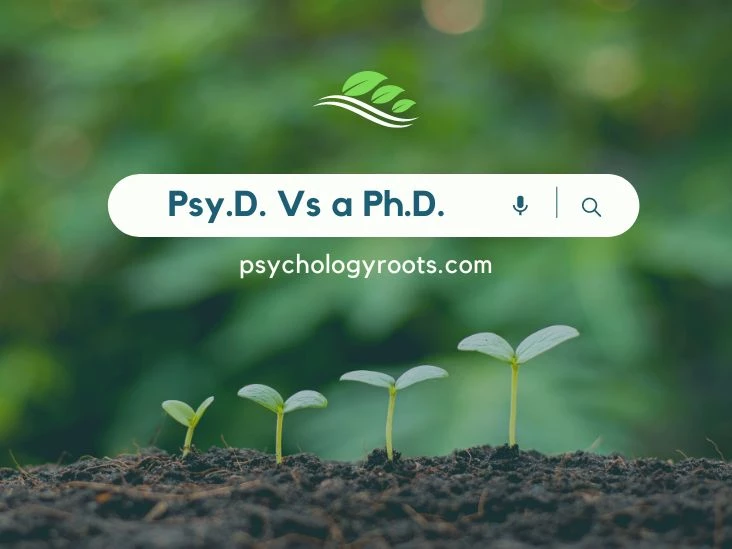Table of Contents
What Is the Difference Between a Psy.D. and a Ph.D.?
Here in this post, we are discussing “What Is the Difference Between a Psy.D. and a Ph.D.?”. You can read more about psychology-related material on our website. Keep visiting Psychology Roots.
Choosing to enrol in a doctoral school, whether it be a Ph.D. or Psy.D., may have far-reaching effects on your professional future. Although both will provide you a solid grounding in your chosen field, you should be aware of the substantial distinctions between the two options. A Ph.D. in psychology is more theoretical and academic, whereas a Psy.D. is more practical.
Although earning either a Ph.D. or Psy.D. in psychology might put you on the path to a career in the field, it’s important to weigh the specific benefits of each degree before committing to one.

Ph.D. in Psychology
A doctor of philosophy in psychology (Ph.D.) is an academic degree with an emphasis on research methodology. It’s easier to find a university that offers a Ph.D. than a Psy.D. programme, and many institutions, both public and private, offer it.
Ph.D. students in psychology acquire and develop expertise in either broad areas of psychology or specific subfields. From clinical psychology to weather and climate psychology, the American Psychological Association (APA) covers a lot of ground.
Benefits of a Ph.D. in Psychology
A significant benefit of a Ph.D. in psychology is that it offers more financial aid options. Financial aid in the form of scholarships, teaching assistantships, or even full or partial tuition waivers is available from many different programmes. You may also be eligible for government and commercial sector-sponsored research grants and fellowships via certain programmes.
An additional perk is that, unlike a Psy.D. degree, several of these courses include instruction in both practical practise and research. You may find better success in the job market if you have dual qualifications.
Psy.D.
A Psy.D., or a doctor of psychology, is also a doctoral degree that focuses on application. A Psy.D. programme prepares students to provide services for patients and clients, rather than a focus on research.
Unlike a Ph.D., Psy.D. programmes are often found in professional schools of psychology that may be university-based, free-standing or in medical or health and science institutions.
Benefits of a Psy.D.
An advantage of a Psy.D. degree is that you may start working with patients sooner in your training than you would with a Ph.D., even if the financial rewards of the latter are greater. In the first year of most programmes, students start taking classes and participating in clinical rotations.
Courses in a Psy.D. programme, like a clinical psychology degree, will concentrate heavily on the knowledge and abilities required to provide effective therapy to clients. Classes may range from advice and oversight to therapy and evaluation, and even more if they focus on specific illnesses.
In some Psy.D. programmes you may be expected to complete a doctoral level research project instead of a dissertation.
What to Think About When Selecting a Program
The first thing to think about while deciding on a degree is the career path you want to follow after graduating. Should you pursue a career in academia or in the classroom? Do you seek employment in the service industry?
The following are some things to think about before making that crucial choice.
Take a look at your school time.
The time commitment for a doctoral degree, whether it be a Ph.D. or Psy.D., is substantial. It is common for programmes to require candidates to have completed both an undergraduate and graduate degree. However, there are certain schools that provide a master’s and a doctorate in a single degree, shortening the time it takes to get either degree and enabling students to join the industry sooner.
Four years of classes and an additional year of internship are typically required for students to graduate. But many hopefuls need five or seven years to complete their education.
Recognize Your Focus
The PhD programme you ultimately decide to enrol in may depend on your intended field of study and area of specialisation.
Common areas of focus in Psy.D. programmes include clinical, counselling, industrial/organizational, and school psychology. In contrast, Ph.D. programmes provide a wider variety of subfields to choose from and place a greater emphasis on research and experimentation to advance knowledge in an area.
Think About Your Future Profession
If you’re trying to select between a Ph.D. and a Psy.D., it’s important to think about your professional goals and hobbies. While most people associate psychology with helping others in the fields of education and healthcare, opportunities for psychologists may also be found in sectors such as business, technology, and many others. It’s not uncommon for psychologists to make six figures.
Accreditation
In order to be eligible for licencing, a doctoral or a doctor of psychology degree programme must be accredited. Completion of an approved programme will not guarantee you a job or a licence, but it will provide you the skills and information you need to succeed in your chosen field.
Help Us Improve This Article
Have you discovered an inaccuracy? We put out great effort to give accurate and scientifically trustworthy information to our readers. Please notify us if you discover any typographical or grammatical errors.
Make a comment. We acknowledge and appreciate your efforts.
If you have any scale or any material related to psychology kindly share it with us at psychologyroots@gmail.com. We help others on behalf of you.